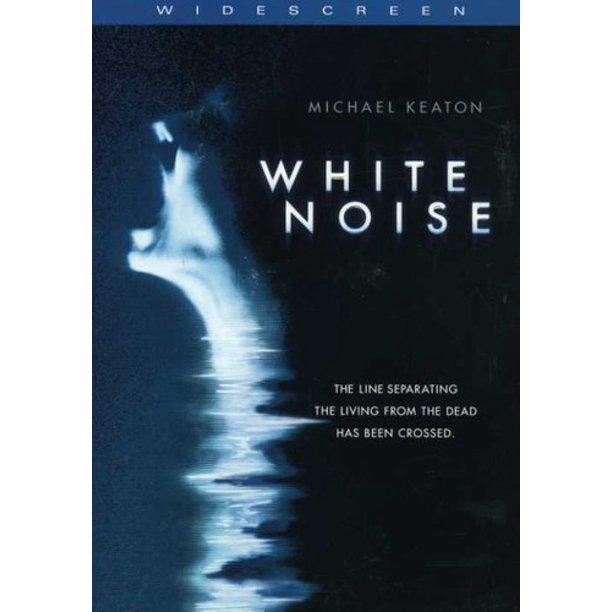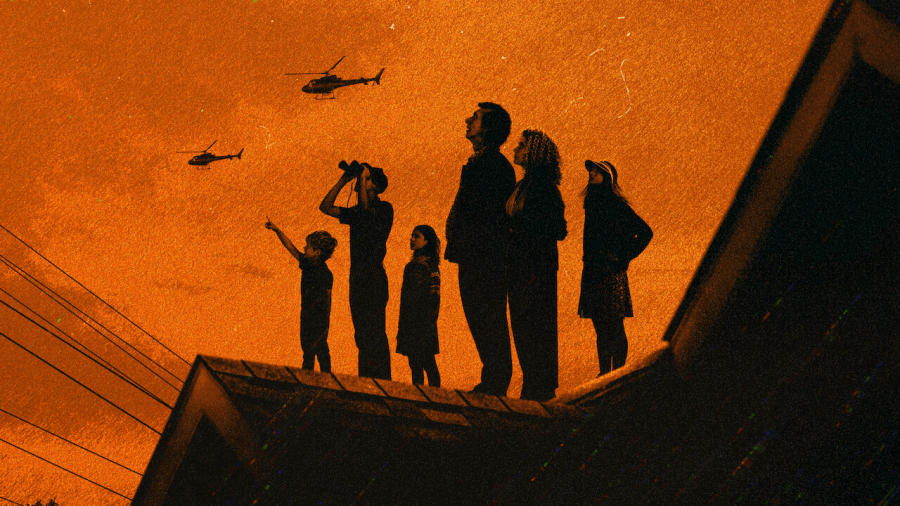White Noise, East Palestine a Message from the Dead...
White Noise refers to electronic voice phenomena called EVP where voices of the dead can be heard on audio recordings.

Three months ago, someone in the federal government decided to use East Palestine as a test site for a new emergency response program. Starting January 26, they handed out free digital IDs called My ID to residents of East Palestine. The cards are trackers that when scanned provide quick medical information to emergency responders. It gets even better.
Last year the Movie White Noise, a faithful adaption of the National Book Award for Fiction; White Noise, written in 1985 by Donald DeLillo, was filmed in various locations around Ohio. Many of the residents of East Palestine appeared in the film as extras. The story revolves around a train wreck and the resulting fiery confabulation that releases an “airborne toxic event” that sweeps through the surrounding countryside.
But the book and the movie in themselves are really about death and the fear of it which is minutely explored in the overly verbose but effective dialogue of its characters. In retrospect the 1990 movie Jacobs Ladder, wherein the main character is dead but is not yet prepared to admit it to himself, was probably heavily influenced by the 1985 book. White Noise ends on the materialistic premise that heaven is a well-stocked supermarket. Whereas in Jacobs Ladder the main character finally realizes he is dead and the demons that haunt him turn into angels and whisk him off to paradise.
Strangely enough there was a popular 2005 movie named White Noise, a supernatural horror thriller. In that movie the title refers to electronic voice phenomena called EVP where voices of the dead can be heard on audio recordings and that is what the movie is about. DeLillo had no reason to name his book White Noise other than he was referring to EVP which was first reported in the seventies. Accordingly, he meant people to take his 1985 book, and by proxy the 2022 movie, as a message from the dead…
The 2022 movie begins sardonically with the Black Elvis Presley Scholar: Murray gleefully describing man’s fascination with automotive wrecks. The scene switches to a campus, splendid in summer bloom, and we meet our star the White Adolph Hitler scholar, Jack. He is married to a neurotic woman; Babett and has four children with her. Jack gives a lecture on Hitler and when a student asks about the plot to kill Hitler, he gives a dissertation on how all plots move us closer to death. Later with his wife he meets Murray in the butcher department of the elaborately stocked supermarket and Murray launches into a soliloquy on blood and the pounding of meat by a blood-stained man.
We find out that Babett is suffering through memory problems caused by her addiction to Dylar, an experimental drug intended to treat the fear of death in its recipients. We are then treated to a surreal duel, simultaneous lectures on Elvis and Hitler respectively by Murray and Jack as their students sit spellbound. Jack whispers the word of the old Norse; “death, death…” and goosesteps about the hypnotized students extolling the virtues of death and pointing at them calling them “the living dead.”
As Jack speaks the scene flashes to a fiery trainwreck attended to by men in environmental suits. There’s an explosion and it becomes an “airborne toxic event” as a great cloud of poisonous gas billows into the sky. Over dinner Babett frets that the toxic cloud which can be seen from their attic window will be coming their way, but Jack assures her that the prevailing winds will blow the cloud north towards Canada (37:00) …
His son Heinrich points out that Jack is wrong and an air mass coming out of Canada is about to blow the cloud south right over them. Siren’s sound and panic ensues as emergency workers drive up and down the streets imploring the inhabitants of the town to flee. There is pandemonium as an endless line of vehicles snake their way through the night in driving toxic rain. Jack is soaked when he gets out for gas.
He catches Babett popping a Dylar in the passenger seat and they finally reach Camp Daffodil, whose gates are demarcated by a hideous totem pole of demons. They find out anyone exposed to the rain for more than ten seconds has been infected. Jack, who was exposed for two and half minutes is infected, but the authorities can’t tell him what effect it will have on his lifespan.
Later in the camp Murray hands Jack a small German pistol and tells him, “There are only two kinds of people in the world killers and dyers.” The next day after an off-road family adventure in their station wagon Jack rejoins the snarled traffic fleeing the airborne toxic event as the radio announces that the cloud continues to move westward (1:10) …
Later in quarantine for ten days its announced that the government will disperse the cloud using microorganisms (certain bacteria like Pseudomonas aeruginosa and mycoplasma eat toxic waste and are used to clean up oil spills). A man stands up from the crowd and gives a speech about the whole world ignoring their plight, and the lack of media coverage. After ten days they are allowed back home. Jack and Murray stroll through the supermarket as Murray likens the colorful aisles to a Persian bazaar telling Jack everything will be fine as long as the supermarket is fine. He tells Jack that the supermarket is a transitional place between life and death.
Life returns to normal in town with only trace elements left of the cloud, but Babitt continues to act strangely, and it becomes apparent she is badly addicted to Dylar. Jack has a pill analyzed and finds out it is an experimental psychoactive drug designed to work on the neural cortex. It is not on the market and was not prescribed to Babett by her doctor. Upon questioning Babett admits she procured the Dylar from a test program she enrolled in through an ad in a supermarket tabloid. When the testing is discontinued Babett makes a deal with one of the doctors to trade sex for Dylar.
Jack finds out who the doctor is and makes an appointment to meet him in a seedy hotel room on the pretext of buying Dylar. Driving there Murrays words echo through his mind about violence being a form of birth and “maybe we can kill death” by killing someone else. Upon entrance to the room Jack meets the doctor who has a thick German accent and is a dead ringer for Harry Vox doing an imitation of Harald Kautz-Vella. The doctor is stoned on Dylar which he is eating like candy, and he tells Jack that Dylar has been a failure on its human test subjects. Jack shoots him twice while he is on the toilet, but he doesn’t die.
Jack plants the gun in his hand in an effort to make it appear like suicide as Babett walks in the room. The doctor fires the last bullet in the gun at them inflicting flesh wounds on both of them. All of them bleeding, they drag the doctor outside and load him into the back of the station wagon and drive through the night in search of a hospital. They find one with an entranceway adorned with a cross and over it a circular window which gives it the appearance of a partial monas hieroglyphica, an alchemical symbol invented by John Dee that nobody knows the meaning of (including Dee).
The church is staffed by German speaking nuns in heavy clerical garb who don’t believe in heaven and scoff at Jack and Babett’s notion of it. When they ask how it is that nuns do not believe in heaven, the mother superior berates them in German (with English subtitles) which neither one of them understand, “anyone who comes in here talking about angels is a numbskull. Show me an angel. Please! I want to see one. Show me a saint. Give me one hair from the body of a saint. It is our task in the world to believe in things no one else believes. If we abandon such beliefs the human race would die out. That is why we are here. A tiny minority. If we didn’t pretend to believe these things the world would collapse. Hell is when no one believes. We pray, lighting candles and asking statues for good health and long life. But not for long. You will lose your believers.” Switching back to English she says over her shoulder as she walks away, “so maybe you should try to believe in each other.”
Everyone, including the doctor, survives their wounds. Jack and Babett return to their happy home. The movie ends with a five-minute choreographed dance routine through the incredibly colorful and well stocked supermarket as Jack and his family dance with hundreds of ecstatic consumers. Langley, Virginia does not appear in the credits, but I suspect it should. After all it:
“Comes out of the Virginia swamps
Cool and slow with a back beat
Narrow and hard to master
Some call it heavenly in it's brilliance
Others, mean and rueful of the Western dream” - The Doors, Texas Radio & the Big Beat
The discrepancies and innuendos in this whole story would be comical if they were not dead serious. They will be discussed later behind a paywall. - Jack






Last night I was mulling over the concept of original sin. I was understanding it as a kind of collective karma, or more precisely as a disempowered remnant of reincarnation.
Death is central to life in this world. If there is no death, then there is only a perpetual state. No death, no original sin, no reincarnation, and certainly there is no exchange and transformation of energy.
Original sin leaves us with a sense of hopelessness, and a justification for a lazy subsidence into the waiting arms of cozy authority. Original sin takes the result of previous actions and collectivizes them into an immovable concept.
We are right now in the midst of complete societal breakdown, death in a certain sense of the word. When we examine the methods and strategies of the self proclaimed leaders of this dying structure, we will only find new avenues for tyranny, punishment, and control.
Nothing here addresses the problem, it simply speeds and spreads the failure.
A pertinent question is how much longer this complex societal structure can absorb the punches from an adrenochrome guzzling psychopathy that believes the only way to run a society is into the ground.
Soon they will be able to contemplate their choices from far less lofty locales.
Death has not been conquered, by Christianity or any other collection of human effort. Death is not averted by devouring children,, and certainly not by accumulating cash. The society is dying, and this death will take with it this entire way of life.
There is no original sin, outside of minds scheming to possess a people, but everything under the sun has it's lifespan, and this iteration of human aspiration is reaching its end.
Tragedy, or breath of fresh air?
You decide.
MK
https://youtu.be/l1PrUU2S_iw
Just like 50 years ago Jack, first the event and a few days later the song above hits the radio.
Everything is bullshit.